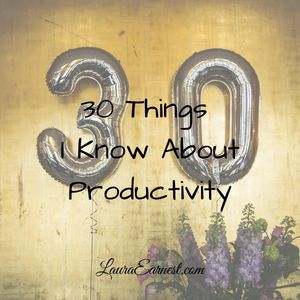
30 Things I Know about Productivity
I’ve been writing this blog (or its variants) since 2007. And yet I still feel like a beginner on so many things!
Someone challenged me, in response to a comment I made about not really knowing anything about productivity, to write a list of 30 things I know about productivity. Here it is:
1. Productivity Is About Not Wasting Your Resources
When it comes down to it, productivity is about not wasting things: your attention, time, energy, efforts. That means that productivity is about getting the most done with the least effort, and not expending anything on things that don’t matter.
2. Productivity Is Not About Slogging Away Tirelessly
Productivity is a way to produce more. However, it is not a way to squeeze blood out of a turnip. It’s not about pushing yourself to the point where you have no life, where you have become a human doing rather than a human being.
3. Productive Means Organized
Disorganization leads to wasted time as we look for things. Organized naturally leads to better productivity. But there is also no gold standard of organization. If you can find things with little or no effort, you’re organized.
4. Getting Rid Of Clutter Is Important
Clutter is just the physical representation of procrastination. Clearing clutter means you are conquering procrastination, but also getting rid of the things and decisions that are holding you back.
5. Filing Systems Needn’t Be Complicated
If I can find everything quickly in one pile, do I need to set up file folders? I don’t think so. Filing can be simple.
6. Effective Is Not The Same As Efficient
Effectiveness is doing the right things. Efficiency is doing things right. Far too often people go for the “hacks”: the doing things faster and better. But if you’re doing the wrong things faster and better, you’re still doing the wrong things.
7. Effective And Efficient Are Two Components Of Being Top-Productive
If you are effective, but inefficient, you are wasting effort. If you are efficient at the wrong things, you are being ineffective. True productivity must look at both.
8. Productivity Is Individual
No one can force another person to be more productive. You have to want it. Likewise, what works for me may not work for you. And vice versa. Productivity is an individual thing we have to discover for ourselves. That doesn’t mean you have to reinvent the wheel, though.
9. Being Productive Can Make Doors Open
This is a personal note: I am the go-to person on the team for finding notes, emails, etc. I also, in my former part time status, put out as much code as a full-time programmer. These reputations allowed me to cut back my hours so I could spend more time with my daughter as she was growing up.
10. Getting Things Done Is About DOING
Getting things done (not the book) is about getting things DONE. It’s not about making lists, color coding, putting files together, etc. It’s also not about what system you use or whose philosophy you follow. It’s not about markers and layouts and washi tape.
It’s about actually doing things and bringing things to closure.
11. Writing Things Down Gets Them Off The Mind
As I age, my mind gets more sieve-like. I worry bits of information around my brain and forget others. Writing everything down allows me to not play the brain game.
12. You Should Never Be Without Some Way To Record Thoughts
If you’re going to write things down to capture those thoughts on your mind, you need to have some way to do it. Always.
13. There Is No One-Size-Fits-All System
Every person is unique, with unique lives, demands, and circumstances. There is no out-of-the-box one-size-fits-all solution that will work for every person. You are not wrong or stupid because you can’t make someone else’s system work.
14. All Systems Have Good Parts To Them
Every system has some merit. It’s up to the user of the system to figure out what will work for them. There are purists out there who will proclaim that the system they follow is the best, and therefore all others are junk. This is not the case, because we all have unique needs.
15. Paper or Digital Doesn’t Matter
Like the system purists, there is the debate between paper and digital. It simply doesn’t matter in the long run. Use what works for you.
16. Crafting Your Own System Is The Only Way To Get A Best Fit
Because we are unique, the best bet is to craft a system that meets our needs. My current system involves a minimalist bullet journal for work, a hybrid digital/bullet journal system for home, and a self-designed paper planner for the blog. It works for me.
17. Ethics Should Be Included In Any Productivity System
We cannot be productive at the cost of our morals. Everything we do should be lived in a framework of our values. This involves knowing yourself and your values well and not being afraid to stand up for them.
18. Not Everyone In The Productivity Game Can Be Trusted
I know of three instances of authors who hold themselves up as paragons in the productivity/life development realm. In all three cases, I was shocked: two overtly, and by their own admission, do what I consider to be unethical practices, and one is involved with an organization that scares me. I learned I have to evaluate everything people say to see if it fits my own moral life.
19. Don’t Spend All Your Time Messing With The System
It is very tempting to spend time tweaking instead of actually getting things done. Tweaking feels like productive work, because after all, you’re working with the system. But it’s fake productivity. Don’t succumb.
20. Don’t Change Just For The Sake Of Changing
I used to upgrade software just because there were new versions. Now I realize that new versions may not necessarily meet my needs. Same with the systems. I change only when I cannot reconcile problems I have with a system and my life.
21. Too Much Technology Can Be A Distraction
I find that having too many gadgets can get in the way of being productive. After all, it’s much more fun to look busy than to actually get things done.
22. Too Little Technology Can Be A Distraction
At the same time, technology can offer advantages. I don’t like rewriting things from day to day, which is why the paper-based planners with task lists didn’t work well for me.
23. The Simpler The Better
Simple is good. Once simple works, it can be embellished. An overly complex system to start with is like trying to change all your habits overnight: it simply won’t work.
24. Having Limited Places To Keep Things Means Less Places To Check
Limiting where I put things means I don’t have to check many. Consolidating email boxes, paper dumping spots, and where I write things down has really simplified my life.
25. Someone Will Always Think Your Implementation Is Wrong
Since everyone is unique, no one system will work for everyone. There are people out there, though, who spend their time looking for the elusive and non-existent perfect system. And if you are courageous enough to share yours, someone inevitably will tell you you’re doing it wrong.
26. Someone Will Always Think Your Implementation Is Complicated
And that it’s complicated, and they can’t do it. Therefore it is wrong. You’re not interested in your own productivity to solve other’s problems.
27. Someone Will Always Think Your Implementation Won’t Work
I laugh at these people because they don’t try it and discard it…they look at an overview and decide it won’t work. Well, if it works for you, it doesn’t have to work for anyone else.
28. The Best System Is The One You Will Use
A friend of mine said to me recently that her trainer told her the best type of exercise is the kind you will do. Same with productivity systems. The best system is one you will use.
29. Tools You Like Are More Likely To Be Used
If you really like it, you will use it. We all have our foibles. I cannot write with a pen that doesn’t feel comfortable. Some people are particular about their paper or notebooks or operating system. Whatever you like is what you will use.
30. You Will Never Get To The Important Things If You Are Mired In The Small Stuff
This doesn’t really fit into the rest. And I think it can’t be repeated often enough: if you are shoulder deep in laundry, it’s hard to figure out what you want to do in 10 years. Getting the small stuff under control allows us to be able to look toward what we dream.




